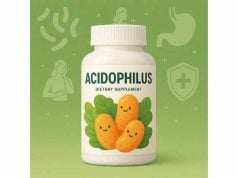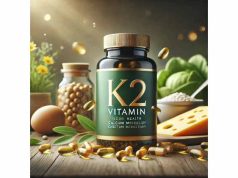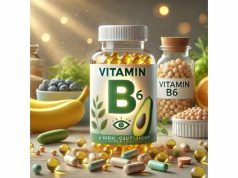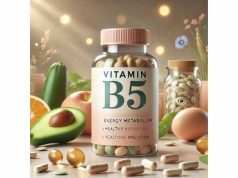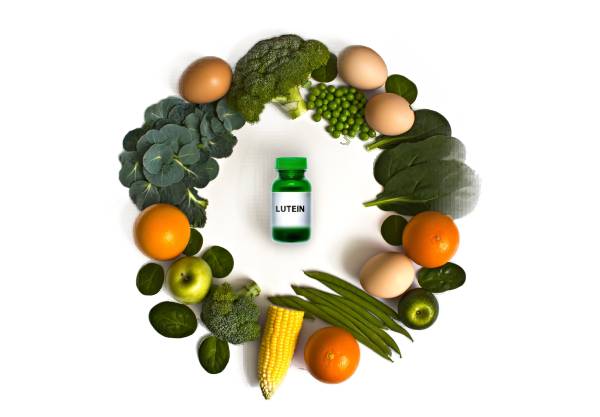
Lutein has gained remarkable recognition as a vital nutrient for maintaining sharp eyesight and protecting the delicate structures of the eye. From reducing the risk of age-related macular degeneration (AMD) to supporting healthy levels of pigmentation in the retina, lutein plays a pivotal role in safeguarding your vision against daily stressors like blue light and oxidative damage. Whether you’re seeking to alleviate digital eye strain or simply wanting to fortify your ocular health, incorporating lutein into your wellness plan may be a valuable strategy. In this comprehensive article, we uncover what lutein is, how it promotes better vision, and the best ways to utilize this nutrient for lasting eye support.
Table of Contents
- Lutein Explained: Origins and Main Characteristics
- Mechanisms Through Which Lutein Supports Clearer Vision
- Prominent Advantages of Lutein for Ocular Wellness
- Effective Ways to Incorporate Lutein for Optimal Eye Health
- Evidence from Studies and Scientific Findings on Lutein
- Frequently Asked Questions about Lutein
- References and Sources
Lutein Explained: Origins and Main Characteristics
Lutein is a naturally occurring carotenoid found predominantly in leafy green vegetables like kale, spinach, and collard greens. Along with zeaxanthin, lutein belongs to the xanthophyll family of carotenoids, which are known for their ability to filter high-energy blue wavelengths of light. This function is particularly relevant to eye health, as the macula—the central portion of the retina—accumulates these carotenoids to protect photoreceptor cells from oxidative stress.
Natural Sources of Lutein
- Leafy Greens: Foods such as spinach, kale, and collard greens are some of the richest sources of lutein.
- Egg Yolks: Containing moderate amounts of lutein, egg yolks also offer beneficial fats that aid in carotenoid absorption.
- Fruits and Vegetables: Orange peppers, corn, and certain berries contain smaller but notable amounts of lutein.
Role in the Human Body
- Blue Light Filtration: Lutein’s optical properties enable it to absorb blue light, reducing the amount of high-energy light reaching the delicate photoreceptors in the retina.
- Antioxidant Protection: As an antioxidant, lutein helps neutralize free radicals, thus maintaining the structural integrity of cells in the eyes and other tissues.
- Synergy with Zeaxanthin: Often paired together, lutein and zeaxanthin form a protective shield in the macula, working in tandem to support vision and eye comfort.
Modern Use in Supplements
Because many people may not get sufficient lutein from their diet alone, supplementation has grown in popularity. Standardized lutein extracts ensure consistent dosing, making it easier to meet recommended daily intake levels for this crucial eye-protective nutrient. Supplements may combine lutein with zeaxanthin, omega-3 fatty acids, or other antioxidants to create a well-rounded formula aimed at comprehensive ocular support.
Mechanisms Through Which Lutein Supports Clearer Vision
Lutein improves vision through multiple interlinked pathways, mainly by providing antioxidant protection and filtering out harmful light frequencies. Understanding how lutein functions in the eye can help underscore its value in any eye-care regimen.
Filtration of High-Energy Blue Light
- Blue Light Hazard
- The retina is exposed to various wavelengths of light daily, but high-energy blue light can generate harmful oxidative stress.
- Lutein, concentrated in the macula, effectively absorbs a portion of this blue light, minimizing damage to the photoreceptors.
- Improving Contrast Sensitivity
- By reducing the scattering of blue light, lutein can enhance contrast sensitivity, potentially making it easier to discern shapes and details in low-contrast situations.
Antioxidant Defense
- Neutralizing Free Radicals
- Oxidative stress occurs when free radicals outnumber the antioxidants in the body. Lutein, as a potent antioxidant, neutralizes these free radicals, preventing cellular damage in the retina and lens.
- Consistent antioxidant support from lutein can slow or halt the progression of degenerative eye conditions.
- Preserving Cellular Integrity
- By protecting lipid membranes and proteins within ocular cells, lutein helps maintain the functionality of photoreceptors.
- This protection ensures that cells can efficiently convert light into visual signals, directly influencing clarity of vision.
Maintaining Macular Pigment Density
- Macular Pigment Optical Density (MPOD)
- MPOD refers to the concentration of lutein and zeaxanthin in the macula. Higher MPOD is associated with better visual performance and a lower risk of age-related macular degeneration (AMD).
- Adequate levels of lutein directly increase MPOD, providing a tangible measure of ocular protection.
- Shielding the Fovea
- The fovea, the center of the macula, is crucial for high-definition vision, such as reading and recognizing faces.
- Lutein’s role in stabilizing the foveal region is essential for tasks requiring fine visual detail.
Anti-Inflammatory Effects
- Reduction of Ocular Inflammation
- Chronic inflammation in the eyes can lead to conditions such as dry eye syndrome and possibly accelerate degenerative diseases.
- Research indicates that lutein exerts mild anti-inflammatory effects, modulating cytokines and inflammatory pathways within ocular tissues.
- Calming Irritated Tissues
- Individuals experiencing eye fatigue or redness from excessive screen time could benefit from lutein’s capacity to soothe irritated ocular surfaces.
- By attenuating inflammation, lutein helps maintain ocular comfort and reduces the impact of environmental stressors.
Synergistic Interactions
- Combining with Zeaxanthin
- Lutein is often paired with zeaxanthin, another carotenoid that shares similar filtering and antioxidant roles.
- The synergy between these two nutrients reinforces the macular pigment, enhancing overall protective benefits for the eyes.
- Interaction with Other Nutrients
- Lutein also works well alongside vitamins A, C, and E, as well as omega-3 fatty acids. These combinations create a robust defense against oxidative stress and inflammation throughout the eye.
Through filtering harmful light, providing antioxidant support, and fostering an environment conducive to healthy retinal and macular function, lutein emerges as an indispensable nutrient for long-term vision improvement and maintenance.
Prominent Advantages of Lutein for Ocular Wellness
Lutein is best known for its key role in preserving sharp vision and preventing damage to the sensitive structures of the eye. Below are some of the primary ways in which consistent lutein intake can elevate ocular health and potentially ward off common eye-related issues.
1. Prevention of Age-Related Macular Degeneration (AMD)
- Macular Shielding:
Adequate levels of lutein help form a protective layer in the macula, which guards against phototoxic damage. This is vital in curbing the onset and progression of AMD. - Slowdown of Degeneration:
Clinical studies suggest that people with higher macular pigment levels often experience slower rates of macular deterioration, contributing to prolonged visual acuity in older age.
2. Reduced Risk of Cataracts
- Oxidation Defense in the Lens:
Cataracts form when the proteins in the lens are damaged by oxidative processes. Lutein’s antioxidant function helps maintain lens transparency, reducing cataract risk. - Long-Term Clarity:
By continuously combating free radicals, lutein can preserve lens health, supporting crisp vision well into later years.
3. Easing Digital Eye Strain
- Screen-Induced Fatigue:
Extended screen use leads to increased exposure to blue light, contributing to eye strain, dryness, and fatigue. Lutein’s capacity to filter this harmful wavelength alleviates these symptoms. - Stable Tear Film:
Some users report reduced dryness when combining lutein with other supportive nutrients, improving overall comfort during prolonged device usage.
4. Enhanced Visual Sharpness and Contrast Sensitivity
- Improved Detail Detection:
By bolstering macular pigment, lutein sharpens the visual image processed by the retina, enhancing color contrast and overall clarity. - Night Vision Support:
Although more research is needed, some evidence suggests that lutein might support better adaptation to low-light conditions, improving night vision performance.
5. Protection Against Blue Light Damage
- Harmful Wavelength Filtration:
Excessive exposure to blue light is linked to photoreceptor stress. Lutein selectively absorbs a portion of this spectrum, safeguarding cells responsible for interpreting visual signals. - Prevention of Oxidative Cascade:
By blocking blue light, lutein helps prevent the oxidative cascade that can result from excessive light-induced stress in the retina.
6. Complementary Support for Overall Eye Function
- Synergy with Other Eye Nutrients:
Lutein often works in tandem with zeaxanthin, vitamins, and omega-3 fatty acids to create a holistic approach to eye health, addressing multiple pathways of degeneration and stress. - Reduced Inflammatory Load:
Low-grade inflammation in the eyes contributes to dryness, discomfort, and potential long-term damage. Lutein’s anti-inflammatory potential can mitigate these risks, keeping eyes healthier and more resilient.
7. Potential Impact on Other Ocular Conditions
- Glaucoma and Diabetic Retinopathy:
While the direct role of lutein in these conditions is still under exploration, its antioxidant and vascular support may benefit individuals dealing with heightened oxidative stress in the eyes. - Post-Surgical Recovery:
Supplementing with lutein could aid in ocular tissue healing after procedures like cataract surgery or LASIK, although more comprehensive clinical data is needed to confirm these effects.
Altogether, lutein offers an expansive suite of benefits that address both common and complex eye health challenges. Whether you are concerned about age-related degeneration or the daily toll of digital devices, lutein stands out as a cornerstone nutrient in the pursuit of clear, lasting vision.
Effective Ways to Incorporate Lutein for Optimal Eye Health
For those seeking to enhance vision or maintain overall eye wellness, incorporating lutein effectively into your daily routine can make a tangible difference. From choosing the right supplement formulation to pairing it with complementary nutrients, here are practical strategies for getting the most out of lutein.
Selecting the Proper Formulation
- Capsules and Softgels
- Standardized Concentrations: Look for products indicating exact lutein content (usually measured in milligrams). A high-quality supplement will specify the source and standardization, often extracted from marigold flowers.
- Convenience: Capsules and softgels are easy to swallow and store, making them an ideal choice for consistent daily use.
- Powdered or Liquid Extracts
- Versatility in Consumption: Powders and liquids can be mixed with smoothies, juices, or meals. This option allows for customized dosing and can be beneficial for those with difficulty swallowing pills.
- Absorption Considerations: Ensure that these extracts are formulated for bioavailability, as lutein dissolves better in fat-based solvents.
- Whole-Food Sources
- Leafy Greens: Spinach, kale, and collard greens are lutein-rich and can be easily integrated into salads, smoothies, or stir-fries.
- Egg Yolks: A moderate source of lutein, eggs also offer complementary fats that boost absorption.
Ideal Dosage Recommendations
- General Guidelines
- Research often supports a daily intake ranging from 10 mg to 20 mg of lutein for meaningful eye health benefits. Some individuals with higher risk factors for macular issues may require more.
- Always consult a healthcare practitioner for personalized dosage based on your age, risk factors, and overall health profile.
- Split Dosing
- Splitting the total daily dose into two smaller servings can help maintain more consistent blood levels of lutein throughout the day.
- For instance, you might take 10 mg in the morning and 10 mg in the evening, especially if you’re aiming for a higher total daily intake.
- Timing with Meals
- Lutein is fat-soluble, so consuming it alongside healthy dietary fats can boost absorption.
- Pair your supplement with a meal rich in avocados, nuts, or olive oil to optimize lutein uptake.
Pairing Lutein with Complementary Nutrients
- Zeaxanthin
- Often combined with lutein, zeaxanthin shares similar protective roles in the macula. Formulas containing both nutrients provide a more robust shield against blue light and oxidative stress.
- Omega-3 Fatty Acids (DHA and EPA)
- Omega-3s help maintain the fluidity of cell membranes in the eyes and support tear film stability. When taken with lutein, the synergy can enhance overall ocular function.
- Vitamins and Minerals
- Antioxidant vitamins like C and E, along with minerals such as zinc, can complement lutein by addressing multiple pathways of oxidative stress in the eyes.
Lifestyle Adjustments to Maximize Lutein’s Effects
- Dietary Patterns
- Embrace a balanced diet with a variety of fruits and vegetables. This ensures not only lutein but also other crucial antioxidants and phytonutrients for comprehensive eye support.
- Limit processed foods and refined sugars, as these can exacerbate oxidative stress and inflammation.
- Adequate Hydration
- Sufficient fluid intake promotes the health of ocular tissues, including proper tear production.
- Dehydration can exacerbate symptoms of eye strain and dryness, diminishing the overall benefits of lutein.
- Screen Time Management
- Combine lutein supplementation with mindful device usage: utilize the 20-20-20 rule, reduce screen glare, and adjust brightness to mitigate digital eye strain.
- Protective measures, such as using blue light filters, can amplify lutein’s role in shielding your eyes from high-energy visible (HEV) light.
Monitoring Progress and Adjusting Your Plan
- Regular Eye Exams:
Schedule comprehensive exams to assess any changes in your macular pigment density or emerging signs of eye strain and disease. - Symptom Tracking:
Keep a journal noting changes in night vision, reduced glare sensitivity, and overall eye comfort. This record will help you evaluate the effectiveness of your lutein regimen and make necessary dosage or lifestyle adjustments.
By following these guidelines—selecting a reliable supplement, aligning dosage with meals, pairing with complementary nutrients, and adopting supportive lifestyle habits—you can optimize lutein’s benefits for better eye health. This multifaceted approach paves the way for clearer vision and robust ocular function over the long term.
Evidence from Studies and Scientific Findings on Lutein
Extensive research over the past two decades underscores lutein’s pivotal role in vision maintenance and age-related ocular disease prevention. While the exact parameters for dosing and outcomes may vary across studies, the consistent thread is that lutein contributes meaningfully to eye health.
Clinical Trials and Observational Studies
- AREDS2 (Age-Related Eye Disease Study 2)
- One of the most widely cited trials, AREDS2, examined the impact of adding lutein and zeaxanthin to an antioxidant formula on the progression of AMD.
- Results indicated that participants receiving these carotenoids experienced a reduced risk of advanced AMD, establishing a strong case for lutein’s protective role.
- Macular Pigment Optical Density (MPOD) Research
- Multiple studies show a correlation between higher dietary or supplemental lutein intake and increased MPOD levels.
- Enhanced MPOD is linked to better visual acuity, contrast sensitivity, and reduced glare-related issues.
- Observational Data on Dietary Intake
- Populations consuming abundant lutein-rich foods, such as Mediterranean-style diets, often exhibit lower incidences of macular degeneration and cataracts.
- While these correlations are not definitive proof, they lend weight to the hypothesis that lutein is a key factor in ocular longevity.
Mechanistic Insights
- Oxidative Stress Reduction
- Lab experiments reveal that lutein can quench singlet oxygen and other reactive species, protecting retinal cells from lipid peroxidation and protein degradation.
- This mechanism is vital for preserving cellular structure and function in the retina.
- Blue Light Filtration
- Imaging and spectroscopic analyses confirm that lutein in the macula preferentially absorbs harmful blue wavelengths, preventing them from reaching deeper layers of the retina.
- This filtration capability is crucial in modern settings, where screen exposure is ubiquitous.
Emerging Areas of Research
- Cognitive and Neurological Benefits
- Recent studies suggest a link between high macular pigment levels (including lutein) and improved cognitive functions, as the same oxidative and inflammatory processes affecting the eye can impact the brain.
- Further investigations are underway to understand whether lutein may have broad neuroprotective roles beyond ocular health.
- Diabetic Retinopathy and Glaucoma
- Preliminary research indicates that lutein’s antioxidant and vascular benefits could potentially slow or mitigate the progression of diabetic retinopathy.
- Although less extensively studied, some data hint at positive implications for glaucoma management, warranting more targeted clinical trials.
- Bioavailability and Formulation
- Scientists are exploring the impact of different carrier oils and co-ingested nutrients on lutein absorption.
- Innovative supplement formulations aim to maximize bioavailability, ensuring a more robust incorporation of lutein into ocular tissues.
In conclusion, the breadth of studies highlighting lutein’s role in eye health—particularly concerning AMD, cataracts, and macular pigment density—offers strong evidence of its significance in preventing or delaying vision decline. Ongoing research continues to expand our understanding, positioning lutein as a cornerstone nutrient in the pursuit of long-term ocular well-being.
Frequently Asked Questions about Lutein
How Soon Can I Expect Vision Improvements from Lutein?
Lutein typically requires several weeks or even months of consistent use to yield noticeable changes. Its benefits accumulate over time by enhancing macular pigment density and protecting ocular tissues from oxidative stress.
Is Lutein Safe to Take Daily?
Yes. Most people can safely consume lutein daily within recommended dosages (often 10–20 mg). However, consult a healthcare provider for personalized advice, especially if you have medical conditions or take other supplements.
Can I Get Enough Lutein from Food Alone?
While foods like kale, spinach, and egg yolks are rich in lutein, many individuals find it challenging to consume sufficient amounts consistently. Supplements can help bridge this nutritional gap but should complement, not replace, a balanced diet.
Does Lutein Help with Digital Eye Strain?
Yes. Lutein helps filter high-energy blue light emitted by screens, potentially easing digital eye strain. Pairing it with proper screen habits—like the 20-20-20 rule—further bolsters its protective effects.
Can Lutein Reverse Existing Vision Problems?
Lutein is more effective as a preventive measure or for slowing progression than for reversing advanced ocular conditions. While it may alleviate certain symptoms, individuals with severe vision impairment should consult a specialist for comprehensive treatment.
References and Sources
- Ma, L., & Lin, X. (2010). Effects of lutein and zeaxanthin on aspects of eye health. Molecular Aspects of Medicine, 33(4), 350–364.
- Bernstein, P. S., Delori, F. C., Richer, S., et al. (2016). The value of measurement of macular carotenoid pigment and its relevance to age-related macular degeneration. Journal of Nutrition, 142(2), 193–199.
- Age-Related Eye Disease Study 2 (AREDS2) Research Group. (2013). Lutein + Zeaxanthin and Omega-3 Fatty Acids for Age-Related Macular Degeneration. JAMA, 309(19), 2005–2015.
- Krinsky, N. I., Landrum, J. T., & Bone, R. A. (2003). Biologic mechanisms of the protective role of lutein and zeaxanthin in the eye. Annual Review of Nutrition, 23, 171–201.
- Stringham, J. M., & Hammond, B. R. (2008). Macular pigment and visual performance under glare conditions. Optometry and Vision Science, 85(2), 82–88.
Disclaimer: The material provided here serves educational purposes and should not substitute for professional medical advice. Always consult a qualified healthcare provider for any concerns regarding vision or starting new dietary regimens.
If you found this information useful, feel free to share it on Facebook, X (formerly Twitter), or any other social platform. Connect with us online for more insights and tips on safeguarding your vision and promoting overall wellness!

